
![]()
Introduction
Chronology
Selected letters of Berlioz
Plombières and its neighbourhood
This page is also available in French
![]()
Plombières, a thermal station with hot springs situated in the Vosges mountains in the east of France, had a history stretching back to Roman times. It had long been a fashionable resort for visitors from all over the country, and was patronised by members of the aristocracy and French rulers. In Berlioz’s time this included the emperor Napoleon III who made frequent visits to Plombières and embellished the city and its thermal establishments. In 1857 Berlioz even toyed with the idea of approaching the emperor during his stay there to try to interest him in the opera Les Troyens he was composing (Correspondance Générale no. 2235, cf. 2238; hereafter abbreviated to CG), though as the Memoirs confirm he changed his mind.
The two visits to Plombières that Berlioz made in 1856 and 1857, accompanied by Marie Recio, were closely related to the concerts he was giving in Baden-Baden at the time. He took the opportunity to stop at Plombières on the way to Baden-Baden for health reasons: this was the period when the long and debilitating illness he suffered from in his later years began to manifest itself. The two visits also coincided with the composition of his monumental opera Les Troyens, and some of the work was actually written or conceived during his stays in Plombières, as the composer’s correspondence shows. In 1856 Berlioz also had the pleasure of being able to see his sister Adèle and her family, who had themselves come to take the waters at the resort, as they did on other occasions. The evidence for his two visits comes in part from the composer’s correspondence (CG); some of the letters were actually written in Plombières. A selection is reproduced below. In the case of the 1856 visit there are also the reports he wrote in the form of two letters addressed to the editor of the Journal des Débats, which were written in Plombières and published later in the year (4 September and 9 September; CG nos. 2164, 2165, 2171, cf. 2230, 2238). Berlioz reproduced them later in 1859 in the collection of short pieces and articles he published under the title of Les Grotesques de la musique. The letters are light-hearted and humorous in tone: he did not take the little town too seriously. From his point of view it was conspicuously barren of serious music-making: it was of course no Baden-Baden, and the best music to be found in the area was not in Plombières itself but was provided by skylarks on walks out in the open… But as Berlioz says Plombières did at least offer to the visitor a most attractive setting:
I mentioned that the vicinity of Plombières offers exquisite sites, grandiose viewpoints, delightful hideaways, resting spots in the woods, all worthy of being celebrated by writers of all times and places such as Virgil or Bernardin de Saint-Pierre. Such is the Val-d’Ajol seen from the Vieille Feuillée, the mountain plateaus on the way there, the springs of King Stanislas, that of the Fox, the vallée des Roches and a dozen others I will not mention. The custom is for the bathers to make their way there after lunch, around eleven o’clock, in small groups organised for these excursions, which are inappropriately referred to as pleasure outings.
In 1860 Berlioz considered again going to Plombières in the summer on the way to Baden-Baden (CG no. 2501) but in the end he and Marie Recio chose to go Luxueil instead, another thermal station not far from Plombières; they stayed there for a few days early in August (CG nos. 2507, 2513bis). The following year he raised again the possibility of a visit to Plombières, though was doubtful because of the cost involved (CG nos. 2548, 2560) and in the end decided not to go (CG nos. 2560, 2562).
![]()
18 July: Berlioz accompanied by Marie Recio departs for Plombières on the way to Baden-Baden (CG no. 2156)
20 July – 5 August: stay in Plombières (CG nos. 2156bis, 2164, 2165, 2168, 2171)
6-18 August: stay in Baden-Baden
19-21 August: return to Plombières with stops at Thann and Remiremont (CG no. 2164)
end August: return to Paris
15 July: Berlioz accompanied by Marie Recio departs for Plombières by rail (CG nos. 2233, 2235, 2236ter, 2237)
16 July – 11/12 August: stay in Plombières (CG no. 2238)
12-24 August: stay in Baden-Baden
25/26 August: return to Paris (CG nos. 2239, 2240)
Early August: Berlioz and Marie Recio stop at Luxueil until August 10 on their way to Baden-Baden (CG nos. 2507, 2513, 2513bis)
10 August: departure for Baden-Baden (CG no. 2513bis)
![]()
To his cousin Odile Burdet (CG no. 2156bis; 29 July, from Plombières):
[…] We arrived here, my wife and I, a week ago, and we found my sister and her husband. Imagine our mutual delight and the vigorous pleasure walks we take every day, under a sun as fierce as at Austerlitz, in a cart with benches or by donkey or on foot (but not without donkeys, which are always to be found among the company in Plombières as everywhere else). Then there is the Emperor who causes all these people to lose whatever little brain they have, and peasants who ask to be blessed, teas or dinners on the lawn given by His majesty, rustic balls, amusements and the local milk. […]
To his sister Adèle (CG no. 2164; 21 August, from Plombières):
[…] I am as sick as a parrot, yet my head is on fire with ideas. I have just written out the opening chorus of Les Troyens which I composed last night in Remiremont and which fortunately I could remember vividly on arriving. All along the way I wrote a sketch for a feuilleton which I will send to the paper in a few days, and which is riotously funny. It is always like that, I have never written such hilarious fantasies as when I have a heavy heart. Marie is a little better after suffering a great deal herself in Baden-Baden. Will we recover here? May God wish it. We will be staying here till the 1st of next month. […]
To his sister Adèle (CG no. 2165; 25 August, from Plombières):
[…] I have started work on a second feuilleton which I would like to finish before my return to Paris; this second feuilleton will be followed by a third, still on the subject of Plombières and Baden-Baden.
Cuvillier-Fleury, whom I met here again and who is leaving tomorrow morning, is taking my first one, and the proofs for it will be waiting for me at home in Paris. I imagine that they will not cause me any difficulties at the paper over the passages referring to the Emperor; there is nothing there that is not above board, and no trace of flattery. I am not going to change a word. The first feuilleton ends with our story with the old lady who led us to Dorothée [see Grotesques]. I will find it difficult to get everything into three letters. (They are letters.)
I want to get several feuilletons done straightaway so that they leave me in peace at the Journal des Débats for a while. As you say, my score Les Troyens is preoccupying me. […]
I have been a little better these last two days; my intestinal pains have greatly diminished. Marie is also experiencing very positive effects from her new baths. This afternoon we went to the Stanislas fountain and as far as the great oak below it. The weather was delightful. […]
To Princess Sayn-Wittgenstein (CG no. 2168; 3 September, from Paris):
[…] While dreaming in the woods at Plombières I have done two important pieces: the first chorus of the Trojan crowds, at the beginning of Act I, and Cassandra’s aria. Then I added two scenes at the beginning of Act V which though short are, I believe, useful and striking. One of these provides scope for a very interesting musical idea. Two Trojan soldiers are keeping guard at night in front of the tents, one walking from right to left and the other from left to right. When they meet in the centre of the stage they exchange views on the stubbornness of their leaders who insist on wanting to conquer this damned Italy, when life is so comfortable in Carthage, where food, lodgings and everything else is so good. […] The contrast between the low instincts of these soldiers and the heroic aspirations of the royal figures is probably a happy one. […]
To his sister Adèle (CG no. 2171; 11 September, from Paris):
It is you who are a bad girl! Your reproaches have just caused my intestinal pains to start all over again, and my diarrhoea is out of control… Look, I go out of my way to call these young ladies the most charming and prettiest petticoats in Plombières, and you find that I have not been courteous… Everything is blamed on the donkeys… and you want these ladies to share in my pronouncements against the pleasure walks!… That is going too far. At least you must agree that we were much better off all three of us on our own on the mountain when we lost our way. It is easy for you to talk about my reticence concerning the Emperor… I had a whole column about him removed, on all the good he is doing in Plombières, etc. etc. This caused quite a stir, M. Édouard Bertin came back specially from the countryside to argue with me; I was about to take my letters to the Constitutionnel. He put me under moral pressure, saying that if they let my paragraph through it would do terrible damage to the paper, that people would say it had been bribed, that the Orléanistes would abandon them, etc. In the end I agreed to have the column removed, but on condition that everything there is in the second letter would stay. And everything did stay… But that is not important.
« We do not doubt that what you are saying is true; but the Journal des Débats cannot say anything in praise of the Emperor. »
That in sum is what these gentlemen think. […]
See also CG nos. 2158bis [vol. VIII], 2166.
![]()
To his sister Adèle (CG no. 2230; 7 May, from Paris):
[…] You will know that M. Bénazet has asked me again to organise and conduct his annual concert in Baden-Baden. Consequently we will be going again to Plombières to spend a few weeks before going there. The concert is on 18 August, I must arrive in Baden-Baden on the 8th, and we shall be in Plombières around mid-July. Will you be coming? Will we be going together, your husband, yourself and I, up in the mountains to have philosophical discussions? I fear that the people of Plombié may intend to slaughter me for having joked rather too roughly about their waters, their swimming-pools, and their trouts… The Emperor is coming again. We are led to hope that the Empress will be there. […]
To his sister Adèle (CG no. 2235; 26 June, from Paris):
[…] We will only be leaving for Plombières on July 15, as the concert in Baden is fixed for 18 August. It really is a heartbreak for my wife and I that we shall not be seeing you there. But the reasons you give me are so reasonable… that I have to accept them. Like you I would be prevented by reasons, without the Baden-Baden concert which successfully disposes of them.
I do not know whether I should try to read my libretto to the Emperor during his stay in Plombières; I have agreed with one of his chamberlains (our compatriot the Marquess of Belmont from Grenoble) that he will arrange this reading for an evening at St Cloud once the Empress is back from Biarritz, and it seems to me better to allow the matter to proceed as has been agreed. […]
To his brother-in-law Marc Suat (CG no. 2237; 6 July, from Paris):
[…] I will be back in Paris coming from Baden-Baden on the evening of the 21st [of August], to welcome Louis who is due to arrive from Marseille around the middle of August. We are leaving for Plombières on the 15th of this month. The railway line from Nancy to Épinal is now complete, so this journey is now easier and faster. […]
To his sister Adèle (CG no. 2238; 4 August, from Plombières):
[…] My mother-in-law went back to Paris the day before yesterday and Marie and I shall be leaving for Baden-Baden next Monday. The waters are doing both of us a lot of good, and this terrible heat which you complain about so much suits us both very well; I find this kind of weather wonderful, it is a tropical climate, and I look around in the woods to see whether there are not already some pineapples such as grow in Guyana and the West Indies. You have no idea how beautiful our woods look at sunrise and when the moon gets up. Three days ago, while Marie was taking her bath, I went on my own very early in the morning to the Stanislas fountain; I had taken my manuscript of Les Troyens, some music paper and a pencil; the landlord had set up for me a table in the shade, with a jug of milk, some kirsch and sugar, and I worked at leisure with this fine view in front of me until nine o’clock. I was actually writing a chorus for which the words seemed particularly appropriate [Act III Scene 1]:Yet I am unable to work seriously here. Our apartment is so cramped that we can barely sit down; our staircase is hardly more than a ladder, etc. etc. We have been deprived of the little room we had at Mme Lippemann’s, and we now have to take our meals at the buffet for residents: it is sweaty and smelly, getting a seat is a crush, and the food is dreadful. During the first few days they thought I was very ill, because I was seething with anger, unable to eat or to say a word. Finally one day Mme Boutaud asked me abruptly whether I intended to carry on for a long time with this kind of conversation, I finally gave up and found my voice again.« Vit-on jamais un jour pareil?…
…………………………………..
« Quel doux zéphir! notre brûlant soleil
« De ses rayons calme la violence
« A son aspect la plaine immense
« Tressaille de joie; il s’avance,
« Illuminant le sourire vermeil
« De la nature à son réveil.
Now that the Emperor is gone we can breathe a little more. The other day Dorothée recognised me at once; she had been shown the first of my Letters from Plombières which were published in the Journal des Débats; she thanked me profusely for having talked about her [see Grotesques]. I had to write something again in her poetry album, and I copied the following passage from Gluck’s Armide [Act IV Scene 2]:« Jamais dans ces beaux lieux notre attente n’est vaineMme Spontini has just arrived here from Paris, and Marie and I are showing her around Plombières which she did not know. […]
« Le lait [in the original: Le bien] que nous cherchons s’y vient offrir à nous,
« Et pour l’avoir trouvé sans peine
« Nous ne l’en trouvons pas moins doux.
[Never in these beautiful places has our expectation been in vain / The milk [in the original: The good] that we are looking for comes to us by itself, / And despite having found it without effort / We none the less find it gentle.]
See also CG nos. 2225, 2233, 2236ter [vol. VIII].
![]()
To Camille Pal (CG no. 2507; 13 July, from Paris):
[…] I am going once more to Baden-Baden to direct the festival, and before that I will be taking the waters at Luxueil. […]
To his son Louis (CG no. 2513bis [see vol. VIII]; August, from Luxueil):
[…] It seems that the waters are doing me some good, and I am following regularly the treatment prescribed to me by the doctor. But it is constantly raining here, and life is terribly boring. I will be leaving on the 10th for Baden-Baden. Marie is in fairly good health and her faith in the baths is increasing. I thought I had heard from you that Suat was already in Plombières. He will presumably inform me when he arrives. […] I shall be in Baden-Baden on the 11th. […]
See also CG nos. 2501, 2513.
For letters of 1861 relating to Plombières cf. CG nos. 2548, 2560, 2562.
![]()
Unless otherwise stated, all the pictures displayed below have been scanned from 19th- and early 20th-century engravings, postcards, and books in our collection, including Plombières-les-Bains, Commémoration du Second Millénaire (Strasbourg, 1935). © Monir Tayeb and Michel Austin. All rights of reproduction reserved.
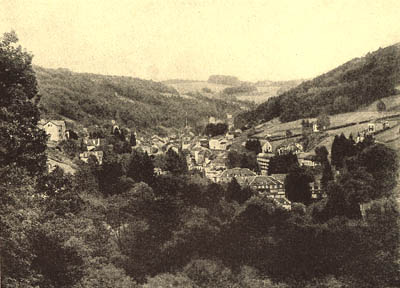
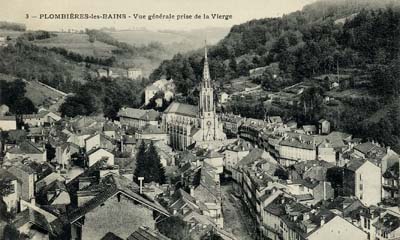
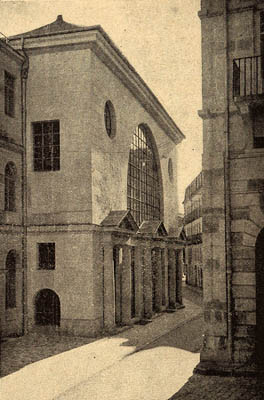
The façade of this building dates back to the time of Napoleon
I, the beginning of the 19th century. ![]()
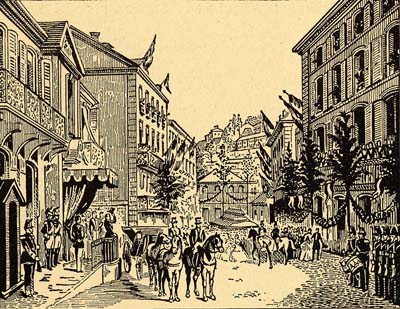
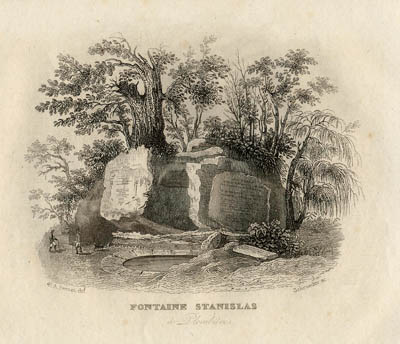
The fountain is named after Stanislas Leszczynski (1677-1766), King of Poland and Duke of Lorraine, who was charmed by it.
In 1857 Berlioz wrote here part of the chorus at the beginning of Act III Scene 1 of Les Troyens (see also the picture below).
The engraving was made by Friedrich Schroeder (1768-1839) after a drawing by François Alexandre Pernot (1793-1865).
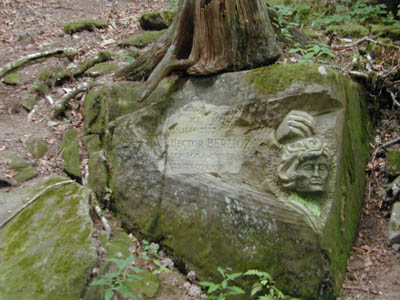
We are most grateful to Mr Bernard Nacarat who sent us the above modern photo.
Berlioz stopped at Thann and Remiremont on 19-20 August 1856 on his journey from Baden-Baden to Plombières. He composed the opening chorus of Les Troyens in Remiremont.
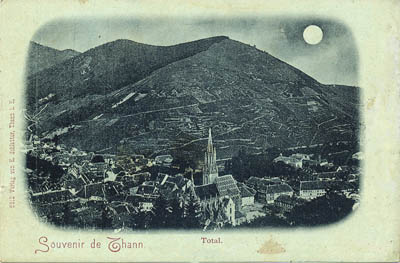
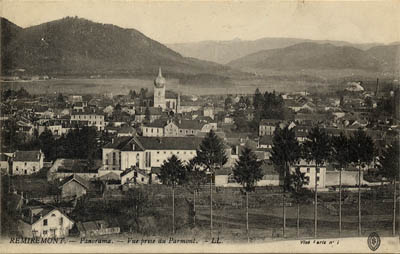
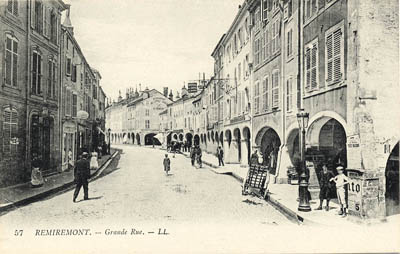
During his stay in 1856 Berlioz went on a walk from Plombières to the Val d’Ajol; in the second of the two letters in the Grotesques he describes the view as follows:
It is a vast cradle of greenery, at the bottom of which lies a reddish village, deposited there like a child’s toy, with a thousand arabesques traced by multi-coloured clumps of fir trees, beeches, birches and elegant ashes, that pride of vegetation in the Vosges. A gentle blue veil hangs over it; it is so peaceful and fresh, and so beautifully framed on all sides. The first urge of the spectator who contemplates the view from the terrace is to throw himself into the open space to swim with delight in this great lake of pure air. But he checks at once his forward impulse, clings to a tree so as not to fall in the precipice, and exclaims like Faust: « If only I had wings!... »
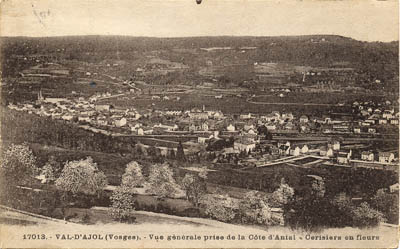
![]()
Related page on this site:
![]()
The Hector Berlioz Website was created by Monir Tayeb and Michel Austin on 18 July 1997;
Berlioz in Plombières page created on 15 October 2007; updated on 1 November 2007. Revised on 1 September 2023.
© (unless otherwise stated) Monir Tayeb and Michel Austin for all the pictures and information on this page.
Copyright notice: The texts, photos, images and musical scores on all pages of this site are covered by UK Law and International Law. All rights of publication or reproduction of this material in any form, including Web page use, are reserved. Their use without our explicit permission is illegal.